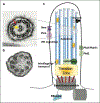Genetic Basis for Congenital Heart Disease: Revisited: A Scientific Statement From the American Heart Association
- PMID: 30571578
- PMCID: PMC6555769
- DOI: 10.1161/CIR.0000000000000606
Genetic Basis for Congenital Heart Disease: Revisited: A Scientific Statement From the American Heart Association
Erratum in
-
Correction to: Genetic Basis for Congenital Heart Disease: Revisited: A Scientific Statement From the American Heart Association.Circulation. 2018 Nov 20;138(21):e713. doi: 10.1161/CIR.0000000000000631. Circulation. 2018. PMID: 30571587 No abstract available.
Abstract
This review provides an updated summary of the state of our knowledge of the genetic contributions to the pathogenesis of congenital heart disease. Since 2007, when the initial American Heart Association scientific statement on the genetic basis of congenital heart disease was published, new genomic techniques have become widely available that have dramatically changed our understanding of the causes of congenital heart disease and, clinically, have allowed more accurate definition of the pathogeneses of congenital heart disease in patients of all ages and even prenatally. Information is presented on new molecular testing techniques and their application to congenital heart disease, both isolated and associated with other congenital anomalies or syndromes. Recent advances in the understanding of copy number variants, syndromes, RASopathies, and heterotaxy/ciliopathies are provided. Insights into new research with congenital heart disease models, including genetically manipulated animals such as mice, chicks, and zebrafish, as well as human induced pluripotent stem cell-based approaches are provided to allow an understanding of how future research breakthroughs for congenital heart disease are likely to happen. It is anticipated that this review will provide a large range of health care-related personnel, including pediatric cardiologists, pediatricians, adult cardiologists, thoracic surgeons, obstetricians, geneticists, genetic counselors, and other related clinicians, timely information on the genetic aspects of congenital heart disease. The objective is to provide a comprehensive basis for interdisciplinary care for those with congenital heart disease.
Keywords: AHA Scientific Statements; genetics; heart defects, congenital.
Figures

Similar articles
-
Genetic basis for congenital heart defects: current knowledge: a scientific statement from the American Heart Association Congenital Cardiac Defects Committee, Council on Cardiovascular Disease in the Young: endorsed by the American Academy of Pediatrics.Circulation. 2007 Jun 12;115(23):3015-38. doi: 10.1161/CIRCULATIONAHA.106.183056. Epub 2007 May 22. Circulation. 2007. PMID: 17519398 Review.
-
Perioperative Considerations for Pediatric Patients With Congenital Heart Disease Presenting for Noncardiac Procedures: A Scientific Statement From the American Heart Association.Circ Cardiovasc Qual Outcomes. 2023 Jan;16(1):e000113. doi: 10.1161/HCQ.0000000000000113. Epub 2022 Dec 15. Circ Cardiovasc Qual Outcomes. 2023. PMID: 36519439 Review.
-
Chronic Heart Failure in Congenital Heart Disease: A Scientific Statement From the American Heart Association.Circulation. 2016 Feb 23;133(8):770-801. doi: 10.1161/CIR.0000000000000352. Epub 2016 Jan 19. Circulation. 2016. PMID: 26787728 Review. No abstract available.
-
Transplantation and Mechanical Circulatory Support in Congenital Heart Disease: A Scientific Statement From the American Heart Association.Circulation. 2016 Feb 23;133(8):802-20. doi: 10.1161/CIR.0000000000000353. Epub 2016 Jan 21. Circulation. 2016. PMID: 26797468 Review. No abstract available.
-
Eligibility and Disqualification Recommendations for Competitive Athletes With Cardiovascular Abnormalities: Task Force 4: Congenital Heart Disease: A Scientific Statement From the American Heart Association and American College of Cardiology.Circulation. 2015 Dec 1;132(22):e281-91. doi: 10.1161/CIR.0000000000000240. Epub 2015 Nov 2. Circulation. 2015. PMID: 26621645 Review. No abstract available.
Cited by
-
Genetic investigation and diagnosis in adults with congenital heart disease with or without structural or neurodevelopmental comorbidity: a retrospective chart review.Front Genet. 2024 Oct 9;15:1412806. doi: 10.3389/fgene.2024.1412806. eCollection 2024. Front Genet. 2024. PMID: 39445160 Free PMC article.
-
The global, regional, and national patterns of change in the burden of congenital birth defects, 1990-2021: an analysis of the global burden of disease study 2021 and forecast to 2040.EClinicalMedicine. 2024 Oct 4;77:102873. doi: 10.1016/j.eclinm.2024.102873. eCollection 2024 Nov. EClinicalMedicine. 2024. PMID: 39416384 Free PMC article.
-
Rare homozygous cilia gene variants identified in consanguineous congenital heart disease patients.Hum Genet. 2024 Nov;143(11):1323-1339. doi: 10.1007/s00439-024-02703-z. Epub 2024 Sep 30. Hum Genet. 2024. PMID: 39347817 Free PMC article.
-
The effect of nutritional risk management program on the growth and development of infants and toddlers with congenital heart disease after discharge.Front Pediatr. 2024 Aug 27;12:1416778. doi: 10.3389/fped.2024.1416778. eCollection 2024. Front Pediatr. 2024. PMID: 39323510 Free PMC article.
-
Congenital heart disease: Epidemiological, genetic and evolutive profil.Tunis Med. 2024 Sep 5;102(9):576-581. doi: 10.62438/tunismed.v102i9.5060. Tunis Med. 2024. PMID: 39287351 Free PMC article. English.
References
-
- Pierpont ME, Basson CT, Benson DW Jr, Gelb BD, Giglia TM, Goldmuntz E, McGee G, Sable CA, Srivastava D, Webb CL. Genetic basis for congenital heart defects: current knowledge: a scientific statement from the American Heart Association Congenital Cardiac Defects Committee, Council on Cardiovascular Disease in the Young. Circulation 2007;115:3015–3038. doi: 10.1161/CIRCULATIONAHA.106.183056 - DOI - PubMed
-
- Priori SG, Wilde AA, Horie M, Cho Y, Behr ER, Berul C, Blom N, Brugada J, Chiang CE, Huikuri H, Kannankeril P, Krahn A, Leenhardt A, Moss A, Schwartz PJ, Shimizu W, Tomaselli G, Tracy C. HRS/EHRA/APHRS expert consensus statement on the diagnosis and management of patients with inherited primary arrhythmia syndromes. Heart Rhythm 2013;10:1932–1963. doi: 10.1016/j.hrthm.2013.05.014 - DOI - PubMed
-
- Lee TM, Hsu DT, Kantor P, Towbin JA, Ware SM, Colan SD, Chung WK, Jefferies JL, Rossano JW, Castleberry CD, Addonizio LJ, Lal AK, Lamour JM, Miller EM, Thrush PT, Czachor JD, Razoky H, Hill A, Lipshultz SE. Pediatric cardiomyopathies. Circ Res 2017;121:855–873. doi:10.1161/CIRCRESAHA.116.309386 - DOI - PMC - PubMed
Publication types
MeSH terms
Grants and funding
- U01 HL098163/HL/NHLBI NIH HHS/United States
- UM1 HL098123/HL/NHLBI NIH HHS/United States
- R01 HL116461/HL/NHLBI NIH HHS/United States
- P01 HL134599/HL/NHLBI NIH HHS/United States
- U01 HL131003/HL/NHLBI NIH HHS/United States
- R35 HL135742/HL/NHLBI NIH HHS/United States
- U01 HG006485/HG/NHGRI NIH HHS/United States
- U19 HD077671/HD/NICHD NIH HHS/United States
- U01 HG006500/HG/NHGRI NIH HHS/United States
- U10 HL109737/HL/NHLBI NIH HHS/United States
- R01 HL109758/HL/NHLBI NIH HHS/United States
- R00 HL130523/HL/NHLBI NIH HHS/United States
- UM1 HL098166/HL/NHLBI NIH HHS/United States
- R01 HL111459/HL/NHLBI NIH HHS/United States
- R01 HL121797/HL/NHLBI NIH HHS/United States
- R01 HL128694/HL/NHLBI NIH HHS/United States
LinkOut - more resources
Full Text Sources
Medical

